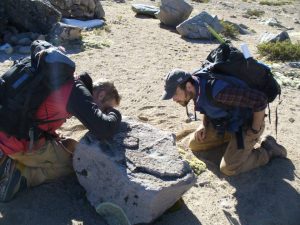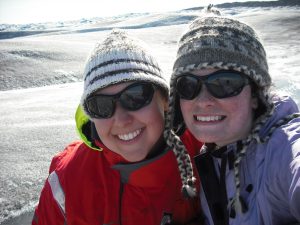Program Requirements

The School of Earth and Climate Sciences offers a B.A. degree in Earth Sciences and a B.S. degree in Earth Sciences with an Earth Sciences or Climate Sciences concentration. We also offer an Earth and Environmental Sciences Concentration through the B.S. in the Ecology and Environmental Sciences program. Our program also provides a wide range of courses accessible to the non-major interested in the Earth and our environment,and we offer a minor in Earth and Climate Science. Our curriculum is designed to prepare majors for careers in Earth Science-related fields, as well as to provide all students with the knowledge they need to address future environmental challenges. B.A. or B.S. Earth Sciences graduates from our program are prepared to enter directly into education, industry, or federal and state agencies. A B.S. is typically required to enter graduate school in Earth Sciences.
For complete details on program requirements, refer to the Undergraduate Catalog. Contact Alice Bernosky (alice.bernosky@maine.edu) to switch majors or add a minor.
B.S.
To earn a B.S. in the School of Earth and Climate Sciences, you must complete the requirements of the core courses, including those in the supporting sciences, and those of one of the two concentrations (Earth Sciences or Climate Sciences), in addition to the University-wide requirements. Only courses for which you earn a C- or higher count toward the major.
Minimum number of credits to graduate: 120
Minimum Cumulative GPA required to graduate: 2.0
Core
ELH 117
One of ERS 101, 102, 103, 107, 108, 121, or 151
ERS 200, 201, 312, 315, 317, 320, 330, 361, 410/499
Ancillary requirements
STS 132 (formerly known as STS 232, either counts)
MAT 116+117 or 126+127
CHY 121+123 and 122+124
PHY 111+122 or 121+122
At least one of: COS 125, COS 215, ERS 301, ERS 350, ERS 420 (If an ERS course is used, it may not also be used to satisfy the ERS elective requirement).
Earth Sciences Concentration
ERS 316
12 additional credits of ERS courses at the 200 level or above.
Climate Sciences Concentration
ERS 121 or 152
ERS 240
SMS 100 or 110
12 credits of electives from the following list:
ERS 323, 350, 401, 420, 425, 441, 444, 460, 480, 542, 553
ECO 381
EES 324
SMS 230
B.A.
To earn a B.A. in the School of Earth and Climate Sciences, you must complete the following courses, in addition to the University-wide General Education and graduation requirements. Aside from the Gen Ed requirements, only courses for which you earn a C- or higher count toward the major.
Minimum number of credits required to graduate: 120
Minimum Cumulative GPA required to graduate: 2.0
Core
ELH 117
One of ERS 101, 102, 103, 107, 108, 121, or 151
ERS 200, 201, 312, 315, 316, 317, 320, 330, 361, 410/499
12 additional credits of ERS courses at the 200 level or above
Ancillary requirements
STS 132 (formerly known as STS 232, either counts)
MAT 116 or 126
CHY 121+123
PHY 111 or PHY 121
Minimum of 72 credits outside the major. (If a particular major requires courses in another discipline, either within the same department or in another department, those credits may still count toward the 72 credits.)
27 credits in the Human Values and Social Context area with at least 12 credits at the 200 level or above
Minors
Earth Sciences Minor
You must complete a minimum of 18 credits of ERS courses in the department, no more than 2 courses at the 100 level. No grade below a C- will be accepted toward these requirements. Only 9 transfer credits can be used toward the minor.
Climate Sciences Minor
You must complete a minimum of 18 credits of courses listed below, no more than 2 courses at the 100 level. No grade below a C- will be accepted toward these requirements. Only 9 transfer credits can be used toward the minor.
100 level: ERS 101, 102, 103, 107, 108, 121, 152
Upper level: ERS 200, 201, 240, 301, 310, 312, 315, 323, 330, 350, 361, 401, 410, 420, 425, 441, 444, 460, 480, EES 398, EES 598
B.S. Ecology and Environmental Science, concentration in Earth and Environmental Sciences
The Bachelor of Science in Ecology and Environmental Sciences is an interdisciplinary program offered cooperatively by the faculties of the Department of Anthropology, Department of Wildlife, Fisheries and Conservation Biology, School of Earth and Climate Sciences, School of Food andAgriculture; School of Biology and Ecology; School of Economics; and School of Forest Resources.
Six Ecology and Environmental Sciences concentrations allow a student to pursue a particular aspect of natural resources in depth with an eye toward future employment or postgraduate study. At a minimum, a concentration will entail 21 credits of course work with at least 15 credits being 300 or 400 level (Junior or Senior) courses. Courses taken as part of the core curriculum cannot be counted towards concentration requirements.
Students in the Earth and Environmental Sciences concentration will study environmental processes in depth from an earth science perspective with a focus on the physical and chemical processes associated with freshwater systems. Knowledge gained through this concentration will be applicable to many socially relevant environmental challenges including: climate and land use change, water quality problems, and water supply issues. This concentration is intended to prepare students for careers in environmental consulting, regulatory or conservation work in both government and NGO sectors, or to prepare students for graduate study in related areas.
Courses are listed below. Please see the EES website or UMaine Undergraduate Catalog for course titles and descriptions.
Core
Ecology and Environmental Sciences (15 credits)
EES 100, 117, 217, 489, 490
PSE 121
PHI 232
ECO 381
Biological and Ecological Sciences (7 credits)
EES 324
SFR 446
SMS 230
SFR 220
ECO 180
Physical and Chemical Sciences (16 credits)
CHY 121, 123, 122, 124
ERS 101, 102, 108
SMS 108
EES 140, 141
Quantitative and Information Skills (6-7 credits)
STS 232
WLE 220
SFR 205
SFR 400
ERS 230
Communication Skills (9 credits)
ENG 101, 212, 315, 317
CMJ 103, 107
SFR 222
Example Schedule
First year fall
- ELH 117
- ENG 101
- ERS 101 or ERS 102
- MAT 111 or MAT 122
- Gen Ed
First year spring
- ERS elective #1
- MAT class
- Gen Ed
Second year fall
- CHY 121
- MAT 126
- ERS 200
- ERS computational requirement
- Gen Ed
Second year spring
- CHY 122
- MAT 127
- ERS 201
- ERS 330
- Gen Ed
Third year fall
- PHY 121
- STS 132
- ERS 315
- ERS 316
- ERS 320
- ERS elective #2
Third year spring
- PHY 122
- ERS 312
- ERS 317
- ERS 410 (Capstone)
Fourth year fall
- ERS 361
- ERS elective #3
- Gen Ed
Fourth year spring
- ERS elective #4
- Gen Ed











